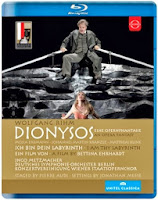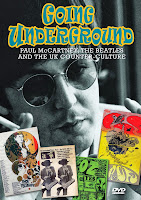- Details
-
Parent Category: Film and the Arts
-
Category: Reviews
-
Published on Monday, 07 October 2013 03:25
-
Written by Kevin Filipski
Blu-rays of the Week
Barabbas
(Vivendi)
This intermittently absorbing three-hour drama, shown on Reelz channel as a mini-series “event,” chronicles the life of the slave famous for being chosen to be saved by the angry mob instead of Jesus Christ.
Its authenticity stems from location shooting in Tunisia, but the acting by Billy Zane in the title role is less than enticing; he never convinces as a larger-than-life character deserving of this televised “event.” For comparison, check out Richard Fleischer’s 1961 Barabbas with Anthony Quinn. The Blu-ray image looks impeccable.
(Eagle Vision)
For the former leader of Roxy Music’s concert to support his first album of originals since 2002 in Lyon, France, Bryan Ferry created an audiovisual extravaganza with dancers alongside a superb band.
Many songs come from his 2010 CD Olympia, but Roxy classics like “Love Is the Drug” and emotive covers of Bob Dylan’s “To Make You Feel My Love” and, as an encore, John Lennon’s touching “Jealous Guy” make the show memorable. Hi-def image and sound are first-rate; lone extra is The Making of ‘Olympia.’
(Unitel Classica)
Wolfgang Rihm’s opera, in its 2010 premiere at Salzburg’s Easter Festival, is dense and dissonant, musically and dramatically: this combination of Greek myth and Nietzschean psychology, while not fully penetrating, is more cohesive than his other stage works.
Pierre Audi’s lucid staging underlines, not obscures, its meaning; the singers—led by Johannes Martin Kranzle’s brilliantly sung Dionysus and Mojca Erdmann’s astonishing vocal virtuosity—expertly dispatch treacherous roles. Conductor Ingo Metzmacher draws a muscular sound from orchestra and chorus. It looks and sounds terrific in hi-def; bonus feature I Am Thy Labyrinth, is a 53-minute featurette about Rihm’s opera.
Halloween—35th Anniversary Edition
(Anchor Bay)
I’m not a big fan of John Carpenter’s original Halloween, but looking back 35 years, it modest approach is something other slasher flicks lacked. Jamie Lee Curtis is all right, Donald Pleasance’s presence is intriguing and Dean Cundey’s muted cinematography works perfectly for a film that’s less about cheap thrills than subdued scares.
The Blu-ray image (supervised by Cundey) looks splendid; extras comprise a new Carpenter and Curtis commentary, new Curtis featurette and 25-year-anniversary featurette.
The Little Mermaid—The Diamond Edition
(Disney)
The 1989 animated film that brought Disney back paved the way for the smash hits to follow, like Beauty and the Beast, Aladdin and, of course, The Lion King. This delightful version of Hans Christian Anderson’s fairy tale has beautifully drawn classic animation, fun tunes like “Under the Sea” and the perfect balance of romance and comedy like Disney’s early masterpieces.
The colors really pop on the exquisite-looking Blu-ray disc; extras include Mermaid voice Jodi Benson featurette, a deleted character, and a new Carly Rae Jepson video.
Oceania—Smashing Pumpkins in 3D
(Universal)
For its Brooklyn Barclays Center show last fall, head Pumpkin Billy Corgan and band tear through two hours’ worth of tunes from their career, starting with the new CD, Oceania, played in full: the biggest response from the sold-out crowd is, unsurprisingly, for classics “Disarm” and “Bullet with Butterfly Wings.”
Filming the concert in 3-D is more gimmicky than necessary, but either way the visuals are flawless, and the surround sound pummels. Extras are interviews with backstage and behind-the-scenes crew.
Portnoy, Sheehan, McAlpine and Sherinian—Live in Tokyo
(Eagle Vision)
Supergroup PSMS—drummer Mike Portnoy, bassist Billy Sheehan, guitarist Tony McAlpine, keyboardist Derek Sherinian—played an incendiary concert in Tokyo last fall: the 90-minute show contains more shredding that one would think possible.
With fretboard wizards Sheehan and McAlpine on stage, even fiery drummer Portnoy cedes the spotlight, but for this cohesive unit, tunes like McAlpine’s “The Stranger” and Sheehan’s “Shy Boy” (from his Talas days in Buffalo) sound as fresh as ever. The Blu-ray image is good, the sound even better; a behind the scenes featurette is the lone extra.
Detective Montalbano—Episodes 23-26
and Maigret—Set 9
(MHZ Networks)
In four more episodes of the Italian procedural series, Detective Montalbano, the good cop (the wonderful Luca Zingaretti) tracks down assorted bad guys while juggling a complicated personal life filled with his own demons and those of his long-distance girlfriend (Katarina Bohm, dubbed into Italian by Claudia Catani).
In the latest—and last—set of five Maigret mysteries, Georges Simenon’s great detective (a superbly cast Bruno Cremer) moves between Paris and the provincial countryside to solve the usual crimes: too bad these are the final episodes from the long-running French TV series.
(HBO/Warner Archive)
The remarkable about-face of disgraced former New Jersey governor Jim McGreevey—who resigned in 2004 amid a sex scandal where he admitted to being homosexual—is recounted in Alexandra Pelosi’s breezy profile.
It shows that McGreevey, who since has studied to become an Episcopal priest, has now reenergized his personal and public lives to become a thoughtful Samaritan to jailed women who want (and need) a second chance.
(Pride)
In this sometimes plodding but fascinating documentary, the ‘60s avant-garde scene is seen through the prism of the Beatles, and Paul McCartney in particular: contrary to popular belief, he led the other three on the underground ride long before John met Yoko.
Interviews with people who were there, vintage footage of the Fab Four and others vital to the scene (like the Beat poets, jazz innovators and Syd Barrett and Pink Floyd) are featured in this informative chronicle. Extras include bonus interviews.
The Machine Which Makes Everything Disappear
(Icarus)
In this somber documentary, Georgian director Tinatin Gurchiani puts out a call for people who want to be in the movies, and the “screen tests” she conducts are illuminating in their commentary on how many Georgians (mostly, but not exclusively, young people) are desperate to escape to the fantasy world created by Hollywood to leave their sad lives behind.
Some of those interviewed are also shown in their everyday lives filled with heartbreak, survival and a little hope. The lone extra is a director interview.
Mama's Family—The Complete Series
(StarVista/Time-Life)
In one of the most inspired TV spin-offs of all-time, Vicki Lawrence’s Mama got her own sitcom after getting non-stop laughs in her Carol Burnett Show sketches, and if the show never reached the heights of hilarity of those skits—stretching from 10 to 25 minutes and keeping character and narrative arcs going does that—it showed that, at its best, it was as inspired as any comedy on network TV. In addition to Lawrence, the incredible cast featured, as Mama’s daughters, none other than Carol Burnett and Betty White.
What makes this complete series boxed set such a must for any fan is that it not only packages all 130 episodes from the series’ six-season run on 24 DVDs, but there are voluminous extras. A cast reunion roundtable, new cast/crew interviews, a conversation between Burnett and Lawrence, Lawrence interviewing Mama via split-screen, the 1982 TV movie Eunice, and sketches from The Carol Burnett Show. This set can only be purchased through the website MamasFamilyDVDs.com.
(Sony)
If you don’t like to watch Seth Rogan, Jonah Hill, Michael Cera, Jay Baruchel and Danny McBride, then this supremely self-indulgent, Armageddon spoof written and directed by Rogen and Evan Goldberg won’t be a productive use of 105 minutes of your time.
Though James Franco is not as annoying, and Emma Watson as delightful as ever—the actors play fictionalized versions of themselves, if such a meta-approach still appeals to anyone—it doesn’t mitigate the fact that this is an unnecessary, belated attempt to parody The Exorcist, Ghostbusters and other end-of-the-world/monster/horror movies. Extras include Rogen and Goldberg’s commentary and two featurettes.























